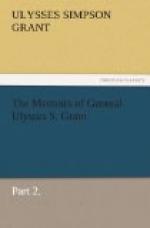When the enemy opened fire on the transports our gunboats returned it with vigor. They were well out in the stream and some distance down, so that they had to give but very little elevation to their guns to clear the banks of the river. Their position very nearly enfiladed the line of the enemy while he was marching through the cornfield. The execution was very great, as we could see at the time and as I afterwards learned more positively. We were very soon out of range and went peacefully on our way to Cairo, every man feeling that Belmont was a great victory and that he had contributed his share to it.
Our loss at Belmont was 485 in killed, wounded and missing. About 125 of our wounded fell into the hands of the enemy. We returned with 175 prisoners and two guns, and spiked four other pieces. The loss of the enemy, as officially reported, was 642 men, killed, wounded and missing. We had engaged about 2,500 men, exclusive of the guard left with the transports. The enemy had about 7,000; but this includes the troops brought over from Columbus who were not engaged in the first defence of Belmont.
The two objects for which the battle of Belmont was fought were fully accomplished. The enemy gave up all idea of detaching troops from Columbus. His losses were very heavy for that period of the war. Columbus was beset by people looking for their wounded or dead kin, to take them home for medical treatment or burial. I learned later, when I had moved further south, that Belmont had caused more mourning than almost any other battle up to that time. The National troops acquired a confidence in themselves at Belmont that did not desert them through the war.
The day after the battle I met some officers from General Polk’s command, arranged for permission to bury our dead at Belmont and also commenced negotiations for the exchange of prisoners. When our men went to bury their dead, before they were allowed to land they were conducted below the point where the enemy had engaged our transports. Some of the officers expressed a desire to see the field; but the request was refused with the statement that we had no dead there.
While on the truce-boat I mentioned to an officer, whom I had known both at West Point and in the Mexican war, that I was in the cornfield near their troops when they passed; that I had been on horseback and had worn a soldier’s overcoat at the time. This officer was on General Polk’s staff. He said both he and the general had seen me and that Polk had said to his men, “There is a Yankee; you may try your marksmanship on him if you wish,” but nobody fired at me.
Belmont was severely criticised in the North as a wholly unnecessary battle, barren of results, or the possibility of them from the beginning. If it had not been fought, Colonel Oglesby would probably have been captured or destroyed with his three thousand men. Then I should have been culpable indeed.




